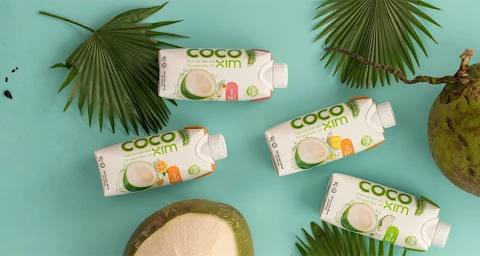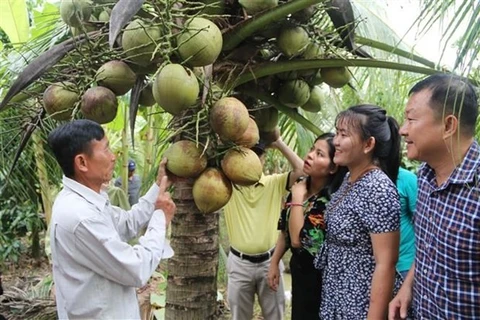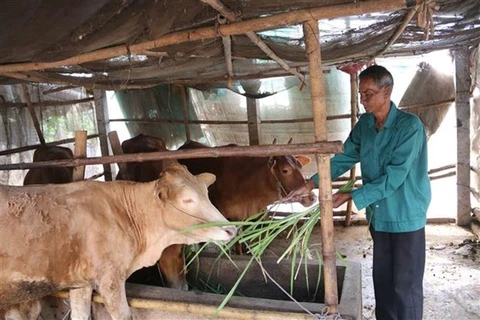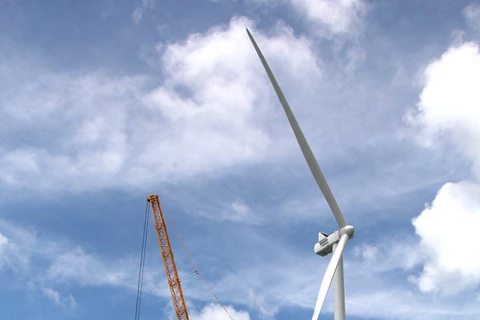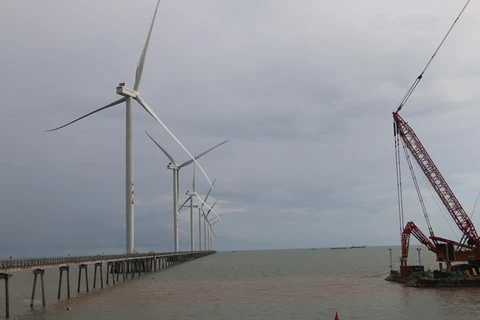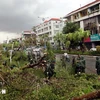Tra Vinh (VNS/VNA) - Authorities in Tra Vinh province are trying to link up companies and farmers growing organic coconuts for mutual benefit.
The companies can ensure they get a steady supply of organic coconuts for processing and farmers are guaranteed outlets and incomes.
The Mekong Delta province is the country’s second largest coconut producer after its neighbour Ben Tre.
It has more than 23,600ha under coconut and an annual output of 250 million nuts, according to its Department of Agriculture and Rural Development.
The department is encouraging companies to link up with farmers to expand organic coconut growing areas and make products from the nuts.
Lam Huu Phuc, Deputy Director of the province’s Department of Planning and Investment, said Tra Vinh had implemented promotional activities to attract investment by coconut companies in Ben Tre to expand organic coconut farming and processing.
Some companies are already in the process of tying up with organic coconut farmers in Tra Vinh.
The Ben Tre Import and Export Joint Stock Corporation has, for instance, contracted farmers with 1,383ha of coconuts that meet international standards in Cang Long and Tieu Can districts.
It will build a plant for semi-processing of coconut products in Tra Vinh.
The Luong Quoi Coconut Co. Ltd is investing in a 150ha organic coconut farm in Tra Vinh city. It is also tying up with a local company to develop another 1,000ha and build a semi-processing plant in Cau Ke district.
Farmers get 10 - 20 percent higher for organic nuts.
Tra Vinh targets having 30,000ha under coconut by 2030, including 5,000ha of organic coconuts.
Tra Vinh is supporting farmers to control the spread of the coconut black-headed caterpillar which has damaged 26.3ha in Tieu Can and Cang Long districts.
The pest first appeared in the province in September last year after appearing for the first time in Vietnam in Ben Tre almost two years ago.
It has also spread to the delta’s other localities like Soc Trang, Tien Giang, and Kien Giang provinces and Can Tho city.
According to Le Truong Son, head of the Tra Vinh Plant Protection and Cultivation Sub-department, the pest is dangerous and could reduce yields by up to 80 percent and even kill coconut trees.
The sub-department is helping affected coconut growing localities spray pesticides to destroy the pest.
In the case of ageing and too tall coconut trees that farmers cannot spray, the sub-department wants them cut down and burnt.
The pest eats leaves and the husk of immature coconuts.
The sub-department has urged the people’s committees of districts and towns to speed up advocacy and training to identify the pest and promptly eliminate it./.
The companies can ensure they get a steady supply of organic coconuts for processing and farmers are guaranteed outlets and incomes.
The Mekong Delta province is the country’s second largest coconut producer after its neighbour Ben Tre.
It has more than 23,600ha under coconut and an annual output of 250 million nuts, according to its Department of Agriculture and Rural Development.
The department is encouraging companies to link up with farmers to expand organic coconut growing areas and make products from the nuts.
Lam Huu Phuc, Deputy Director of the province’s Department of Planning and Investment, said Tra Vinh had implemented promotional activities to attract investment by coconut companies in Ben Tre to expand organic coconut farming and processing.
Some companies are already in the process of tying up with organic coconut farmers in Tra Vinh.
The Ben Tre Import and Export Joint Stock Corporation has, for instance, contracted farmers with 1,383ha of coconuts that meet international standards in Cang Long and Tieu Can districts.
It will build a plant for semi-processing of coconut products in Tra Vinh.
The Luong Quoi Coconut Co. Ltd is investing in a 150ha organic coconut farm in Tra Vinh city. It is also tying up with a local company to develop another 1,000ha and build a semi-processing plant in Cau Ke district.
Farmers get 10 - 20 percent higher for organic nuts.
Tra Vinh targets having 30,000ha under coconut by 2030, including 5,000ha of organic coconuts.
Tra Vinh is supporting farmers to control the spread of the coconut black-headed caterpillar which has damaged 26.3ha in Tieu Can and Cang Long districts.
The pest first appeared in the province in September last year after appearing for the first time in Vietnam in Ben Tre almost two years ago.
It has also spread to the delta’s other localities like Soc Trang, Tien Giang, and Kien Giang provinces and Can Tho city.
According to Le Truong Son, head of the Tra Vinh Plant Protection and Cultivation Sub-department, the pest is dangerous and could reduce yields by up to 80 percent and even kill coconut trees.
The sub-department is helping affected coconut growing localities spray pesticides to destroy the pest.
In the case of ageing and too tall coconut trees that farmers cannot spray, the sub-department wants them cut down and burnt.
The pest eats leaves and the husk of immature coconuts.
The sub-department has urged the people’s committees of districts and towns to speed up advocacy and training to identify the pest and promptly eliminate it./.
VNA

